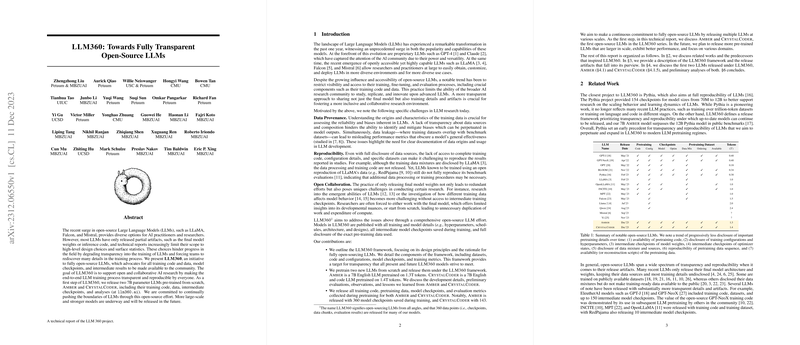Introduction
The paper introduces LLM360, an initiative to enhance the transparency of LLMs by promoting the open-sourcing of comprehensive training details. The initiative underscores the recent trend in restricting access to training processes of LLMs, creating hurdles to replicability and innovation. LLM360 aims to reverse this trend by advocating the sharing of training codes, data, model checkpoints, and analyses. As part of this initiative, the paper highlights the release of two LLMs, AMBER and CRYSTAL CODER, accompanied by extensive training materials made available to the public.
Transparency and Challenges in LLM Research
The open-sourcing philosophy behind LLM360 extends from model weights to training codes and the nuanced details involved in the creation of LLMs. This approach is designed to combat several challenges faced in the LLM field, such as:
- Data provenance and the consequential understanding of training data to mitigate biases.
- Reproducibility hurdles due to the non-disclosure of full training configurations, impediments in validating reported results.
- The barrier to open collaboration caused by the release of only final model weights, which limits research into emergent abilities or training data effects on LLM behavior.
LLM360 Framework and Initial Model Releases
LLM360 focuses on a complete open-source effort that includes all training components, intermediate checkpoints, model configurations, and data origins. Specifically, the paper discusses the introduction of AMBER and CRYSTAL CODER, LLMs trained from scratch with respective parameter scales of 7B, showcasing their development details, data sources, and training methodologies. The framework embodies model transparency from code, training procedures, to intermediate checkpoints, aiming to set standards for future model releases.
Future Directions and Conclusion
Looking ahead, LLM360 promises the publication of larger, more powerful models while maintaining open-source principles. The initiative paves the way for continuous research collaboration and methodological development, aiming to address better training data mixtures, filtering techniques, and optimization strategies. The paper concludes with a commitment to the LLM360 vision of propelling sophistication and openness in LLM pre-training domains while acknowledging the need for responsible use, risk management, and community engagement.
